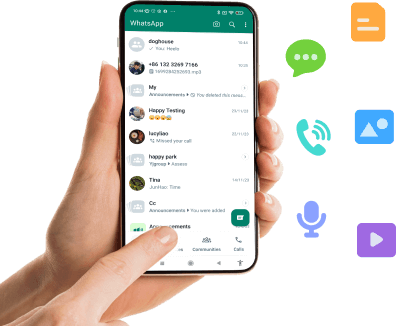ClevGuard Support: Monitor Devices with Others' Permission.
With more than two billion users worldwide, WhatsApp is one of the most widely used messaging platforms. Children often find it attractive because it is free, fast, and allows them to stay connected with friends. But as a parent, you may ask: Is WhatsApp safe for kids?
The answer is not simple. While WhatsApp has built-in privacy and safety features, it also poses risks such as cyberbullying, exposure to strangers, and inappropriate content. In this guide, we’ll explain the pros and cons of WhatsApp for kids, explore WhatsApp’s own child-safety features, and introduce a powerful monitoring tool — KidsGuard for WhatsApp — to help parents ensure their child’s safety.
Table of Contents
Part 1: Why Kids Use WhatsApp?
Part 2: Benefits of WhatsApp for Kids
Part 3: Risks of WhatsApp for Kids
Part 4: WhatsApp’s Own Child-Safety Features
Why Kids Use WhatsApp?
Kids are drawn to WhatsApp for several reasons:
- Free messaging and calls over Wi-Fi or mobile data.
- Group chats with classmates, family, or hobby clubs.
- Fun features like stickers, emojis, and voice notes.
- Accessibility since WhatsApp works on almost any smartphone.
Benefits of WhatsApp for Kids
While parents are often concerned about the risks of WhatsApp for kids, it’s equally important to recognize its positive aspects. With proper guidance and monitoring, WhatsApp can become a helpful tool for children in communication, learning, and social development.
Staying Connected with Family and Friends:
WhatsApp allows children to maintain close relationships with relatives and friends, especially when they live far away. This can provide emotional support and reduce feelings of isolation.
Educational Support:
Many schools and teachers use WhatsApp groups to share homework, study resources, and class updates. Kids can benefit from this direct access to information and improve their learning efficiency.
Developing Digital Communication Skills:
By using WhatsApp, children gradually learn digital etiquette, emoji expression, and group collaboration skills—abilities that will serve them well in both academics and future careers.
Teamwork and Social Skills:
Participation in interest-based or study groups helps kids learn teamwork, problem-solving, and peer-to-peer collaboration in a digital setting.
Cross-Cultural Communication:
WhatsApp enables kids to connect with peers from different cultures and countries, fostering broader perspectives and global awareness.
Of course, all these benefits come with the condition of parental guidance and safety measures . Without proper oversight, WhatsApp may expose kids to inappropriate content.
Risks of WhatsApp for Kids
Cyberbullying:
Group chats can intensify peer pressure and bullying. Hurtful jokes or exclusion in school WhatsApp groups can seriously affect a child's confidence.
Stranger Danger:
If kids' phone numbers leak, strangers may attempt to contact them. Some children even get unsolicited invitations to groups with unsafe themes.
Privacy Concerns:
WhatsApp shares profile photos, statuses, and last-seen information by default. Without strict privacy settings, children may unintentionally expose personal data.
Inappropriate Content:
One of the biggest dangers is exposure to adult-oriented WhatsApp groups. These may include:
- WhatsApp porn group invitations, often shared by spammers.
- Sexy group on WhatsApp links that circulate online and may expose kids to explicit materials.
- Gay WhatsApp group links, which sometimes appear in forums or websites and may redirect to inappropriate chatrooms.
While adults may join such groups voluntarily, children are often tricked or added without consent. Exposure to pornography, sexual discussions, or explicit images can damage a child's mental well-being and development.
Addiction Issues:
Notifications, constant group chats, and "fear of missing out" (FOMO) can lead to overuse, impacting schoolwork and sleep patterns.
WhatsApp’s Own Child-Safety Features
First of all, WhatsApp has age restrictions for users. In most countries (including the U.S.), the minimum age is 13 years old. In Europe, under GDPR, the minimum age is 16 years old.
However, surveys show that many children below these ages still use WhatsApp, often with parental permission—or without parents knowing.
So WhatsApp has introduced several protections to enhance safety for younger users:
- Group Invite Restrictions: Kids cannot be added to groups without their approval if privacy is set correctly.
- Report and Block: Children can easily report inappropriate accounts or block unknown contacts.
- Forwarding Limits: Messages can only be forwarded to a small number of chats, reducing the spread of harmful content.
- Two-Step Verification: Prevents unauthorized logins.
- Disappearing Messages: Helps control the permanence of shared content.
- Profile Privacy Controls: Parents can help kids hide their profile photo, last seen, and online status from strangers.
These features are useful, but they are not enough to fully protect children from risks.
Parental Control Tools for WhatsApp
Parents often need advanced solutions beyond WhatsApp’s built-in settings. KidsGuard for WhatsApp is a specialized monitoring tool designed for WhatsApp only.

Key Features of KidsGuard for WhatsApp
- Read WhatsApp Chats: Access both sent and received messages.
- Monitor Media Files: Check shared photos, videos, voice messages, and documents.
- Track WhatsApp Calls: See logs of incoming and outgoing calls.
- Keyword Alerts: Get notifications when sensitive words appear in conversations.
- Stealth Mode: Works invisibly, so kids won't feel monitored directly.
- Data Backup: Keep records of important chats in case they are deleted.
This app is particularly effective for parents who want peace of mind while respecting their child’s digital space.
FAQs About "Is WhatsApp Safe for Kids"
Q1: What is the official minimum age for WhatsApp?
The minimum is 13 in most countries and 16 in Europe. However, WhatsApp does not actively verify age, so parental supervision is essential.
Q2: Can WhatsApp prevent strangers from contacting my child?
Yes, if you enable privacy settings like "My Contacts Only" for profile photo, last seen, and status. Additionally, kids can block or report strangers easily.
Q3: How can I monitor my child's WhatsApp without invading their trust?
The best way is combining open communication with tools like KidsGuard for WhatsApp, which gives parents visibility without constantly checking the child's phone manually.
Q4: Does WhatsApp have child protection features?
Yes, such as group invite restrictions, reporting tools, message forwarding limits, and privacy settings. However, these rely on correct configuration and do not cover all risks.
Q5: What risks are unique to WhatsApp compared to other social media apps?
Unlike open networks (Instagram, TikTok), WhatsApp is private by default. But the risks include cyberbullying in group chats, spam from unknown numbers, and exposure to inappropriate files.
Conclusion
So, is WhatsApp safe for kids? The answer is: partially, but only with guidance. WhatsApp itself has several built-in safety features, but they are not enough to fully protect children from online risks.
WhatsApp comes with certain child protection mechanisms, but they are not enough to address all the risks. Parents can keep their children safe with the help of specialised tools such as KidsGuard for WhatsApp. This way, children can enjoy the convenience of WhatsApp while having the peace of mind that comes with parental protection.




